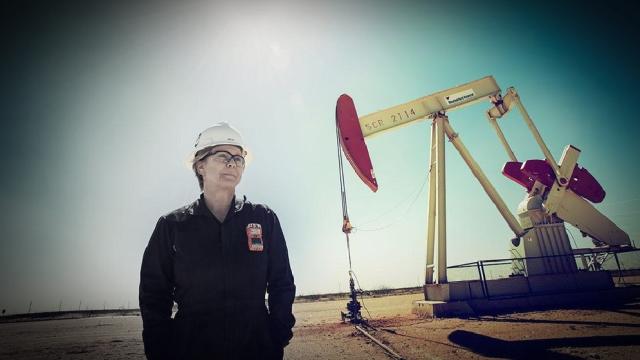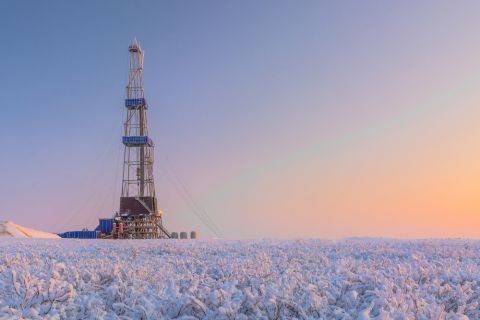
“We’re definitely going all in [on carbon management],” Occidental Petroleum CEO Vicki Hollub said. “This is going to be huge for us.” (Source: Occidental Petroleum Corp.)
Occidental Petroleum Corp., a longstanding titan of the U.S. oil sector, says it is doing more than Tesla to reduce greenhouse gas emissions, as it seeks to build up its carbon management business in response to investor demands over climate change.
Vicki Hollub, Occidental’s CEO, said the amount of CO₂ the company pumped back underground in the oil extraction process exceeded the electric-car maker’s contribution towards decarbonizing the atmosphere through switching people away from combustion engines.
“What we’re sequestering today takes essentially about 4 million cars off the road on an annual basis,” Hollub told the Financial Times. “It does more than what Tesla’s doing right now—although we need Tesla to continue what they’re doing. It’s going to take everything.”
Hollub’s claims do not take into account the volume of carbon Occidental—one of America’s biggest oil and gas producers—pumps into the atmosphere from its operations and the burning of its oil. And while it does inject about 20 million tonnes of CO₂ back into the ground annually, it does so in order to make the extraction of more oil easier.
Occidental produced about 1 million boe/d in 2019. Doing so emitted about 28 million tonnes of CO₂ equivalent from its operations. The subsequent burning of that oil by its customers in the form of petrol and other fuels emitted a further 103 million tonnes of CO₂ equivalent—though the company said that these so-called Scope 3 emissions were beyond its control.
For its part, Tesla delivered about 500,000 electric vehicles in 2020, most of which switched drivers away from carbon-spewing combustion engines, and says its cars have cut U.S. emissions by about 3.7m tonnes to date. It did not respond to a request for comment.
Hollub’s comments come as Occidental looks to expand the part of its business focused on the management of carbon emissions by capturing, reusing and storing them. By 2050 it says the volume of emissions it replaces will equal those it creates. It is the only significant U.S. oil producer with a target to cut emissions to net-zero both from its own operations and those of its customers.
Occidental already has the largest carbon management operations globally and has plans to build the first large-scale direct air capture plant by 2023, which will pull carbon out of the atmosphere to be pumped underground.
Carbon management will generate as much revenue for the company as its chemicals business within 15 years, Hollub said. By 2050, she said it would account for more revenue than its oil and gas and chemicals businesses combined.
Occidental’s shift in approach comes as it tries to carve out its own niche in the changing oil production landscape after its disastrous purchase of Anadarko Petroleum for $56 billion in 2019, a deal that racked up billions of dollars in debt, sent its share price tumbling and entangled it in a stand-off with activist investor Carl Icahn.
Its troubles were accentuated by last year’s coronavirus-induced oil price crash, which forced it to book hefty writedowns. The company’s shares have fallen more than 60 per cent since the beginning of 2019.
Investors have piled pressure on oil producers to eliminate their contribution to climate change by cutting their emissions.
Occidental’s carbon management-focused response stands in contrast to the approaches taken by many of its rivals. European oil majors such as BP Plc and Royal Dutch Shell Plc have signaled a shift into renewables. Other U.S. producers such as ConocoPhilips Co. remain focused on oil but have committed to cutting emissions from their own operations to net zero—but not those from the burning of their oil. Exxon Mobil Corp. is doubling down on oil production.
“We’re definitely going all in [on carbon management],” Hollub said. “This is going to be huge for us.”
Recommended Reading
Biden Administration Criticized for Limits to Arctic Oil, Gas Drilling
2024-04-19 - The Bureau of Land Management is limiting new oil and gas leasing in the Arctic and also shut down a road proposal for industrial mining purposes.
Exclusive: The Politics, Realities and Benefits of Natural Gas
2024-04-19 - Replacing just 5% of coal-fired power plants with U.S. LNG — even at average methane and greenhouse-gas emissions intensity — could reduce energy sector emissions by 30% globally, says Chris Treanor, PAGE Coalition executive director.
Renewed US Sanctions to Complicate Venezuelan Oil Sales, Not Stop Them
2024-04-19 - Venezuela’s oil exports to world markets will not stop, despite reimposed sanctions by Washington, and will likely continue to flow with the help of Iran—as well as China and Russia.
US Orders Most Companies to Wind Down Operations in Venezuela by May
2024-04-17 - The U.S. Office of Foreign Assets Control issued a new license related to Venezuela that gives companies until the end of May to wind down operations following a lack of progress on national elections.




